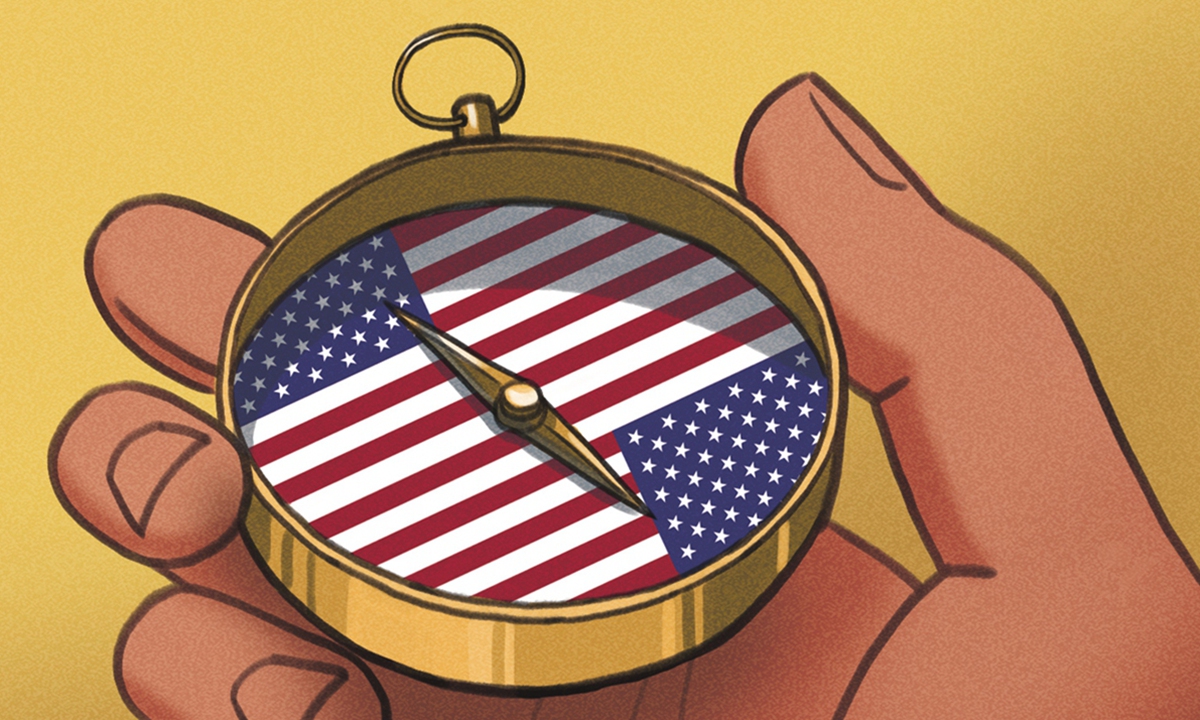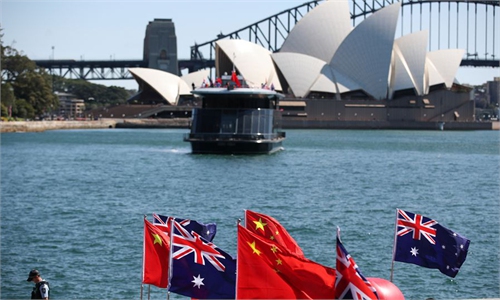Australia incorrectly believes US will protect its interests: former Australian diplomat

Illustration: Liu Rui/GT
Editor's Note:
Closely following US footsteps in an anti-China campaign, Australia has screwed up relations with China. This has plunged bilateral relations to its lowest ebb in decades. Senior US officials from the Biden administration expressed support to Australia in its confrontation with China on several occasions, how will the US factor influence Australia's China policy?
Worsening relations with China have cost Australia dearly, does the Australian government have the wisdom and courage to change the confrontation course? Global Times reporter Yu Jincui talked to Bruce Haigh, an Australian political commentator and former diplomat, in a written interview.
GT: In your recent article, you said "Australia risks ostracism from the rest of Asia if it continues to stringently oppose China." Why did you issue such a warning? In your opinion, has the Morrison government realized the need to change its China policy to avoid confrontation with China?
Haigh: China is the most powerful country in Southeast Asia. Short of nuclear weapons, the US will find it increasingly difficult to project power and influence into the region. China is able to project that influence and power. SE Asian states are aware of the real politic. They will act and conduct their diplomacy and relations accordingly.
Australia believes, incorrectly in my opinion, that the US will protect its interests. That is naïve. The US cannot build bridges for Australia into SE Asia and with China. Australian thinking and evolving policy amounts to isolationism.
The Morrison government does not realize the need to change its China policy. Weirdly and childishly, it says it will not allow Australian "values" to be undermined by China, whatever that means. However other people in Australia deplore the Morrison government's China policy. They include a cohort of former diplomats and academics, as well as people with firsthand knowledge of China.
GT: What role has the US played in Australia's China policy? US Indo-Pacific Coordinator Kurt Campbell recently said that the US would not agree to improve its relations with China until Beijing stops its "economic coercion" of Australia. What does the US "support and backing" mean to Australia? Will Australia go further with its confrontational ways against China?
Haigh: The US has dictated Australia's China policy over the past seven years, first by Turnbull and then Morrison. Both sought to please the US. Pleasing the US is Australia's default position with respect to foreign affairs and defence.
Biden was stung by the strong stance taken by Chinese top diplomats Yang Jiechi and Wang Yi at Anchorage. Biden has declared that what is now at stake is "autocracy or democracy." What this fails to address is good governance. It has been reported that US leaders have vowed to "intensify competition with Beijing in the wake of the acrimonious anchorage meeting." It seems that rather than learn from Anchorage the Biden administration is going to maintain if not ramp up Trump's anti- China policies.
Blinken has repeated criticism that China has undertaken "blatant economic coercion of Australia" which he said was an example of the "urgent threat posed by a resurgent authoritarian regime." At the same time the Australian Ambassador to China, Graham Fletcher, addressing the Australia/China Business Council said China was being 'vindictive' toward Australia. He claimed, "the escalating pattern of trade punishment had generated sympathy for Australia and hardened attitudes toward China around the Globe."
This is in accord with instructions from Canberra and no doubt passed from Washington. The trade and diplomatic problems faced by Australia are as a result of complying with the US. The "support and backing" promised by the US is welcomed by the LNP Morrison government. It will continue to follow the US in relation to China even though that by doing so it is harmful to Australia's fundamental interests. The Murdoch media which control 70% of the flow of information in Australia backs this position.
GT: Biden is attempting to organize a grand alliance to counter China. What role will Australia play in the US' plan? Australia followed the US lead in the anti-China campaign during the Trump era. Will there be any difference under Biden?
Haigh: Biden seems to have some sort of grand alliance in mind based on the premise that China is dangerous and seeks to dominate world affairs. For as long as that narrative is accepted there will be some countries who will continue to follow the US. Australia will follow the US position on China for as long as it has an LNP government. An Australian Labor government will have a different and more positive perspective on China, but will still adhere to what is termed the American Alliance.
The current LNP government will maintain a defensive and negative position toward China even though Australia suffers as a result of trade disputes. It does not have the imagination or courage to do anything else. It lacks the maturity to negotiate.
GT: Australia is tilting more toward the US. Why is Australia making such a policy option? Is such a trend by the Morrison government in line with Australian interests?
Haigh: Australia lacks leadership and has done so since Howard became Prime Minister in 1996. Australia was a colonial settlement that displaced the local Indigenous inhabitants. It allowed the United Kingdom to dictate foreign and defence policy until 1942, and then in the face of a threat from the Japanese switched its alliance to the United States who has dictated Australian foreign and defence policy since then. It has a foreign head of state who is based overseas. It is a rich country, or it was, with a small population which lives off agriculture and mineral extraction. It is inwardly focused and narrow in outlook. It seeks to use the United States as a buffer against the rest of the world, particularly Asia and China which it fears because of enterprise and numbers of people.
Morrison's policy toward China is not in Australia's interest from an economic, scientific, educational and cultural perspective.
GT: Australia is a Five Eyes member and a Quad member. The Australia and the US are allies, how much room does Australia have for its foreign policy independence? You once said the Australia has ceded its sovereignty to the US. Do you have specific suggestions on how Australia might not align itself so closely with the US?
Haigh: Since the ending of the Cold War the US alliance has been of decreasing value for Australia. In fact, it has cost us in terms of our involvement in Iraq and Afghanistan, two totally unnecessary undertakings in terms of Australia's national interest.
If Australia had the courage, it has the capacity for an independent foreign policy. New Zealand has demonstrated that.
Australia has ceded sovereignty to the US for the reasons mentioned above plus the cultural dominance effected by the common language of English, whether through movies, music, magazines or Murdoch.
The Quad is a hasty and hopeless attempt to contain China. Only the current Australian government believes in it. Five Eyes is a Western intelligence turn on but it delivers little because the US is not an honest broker. It withholds information. And it seeks to spin the information it gleans. Reading Five Eyes information, one must learn to read between the lines. And remember Pine Gap. A US spying facility in Australia where the host country only receives 60-70 percent of the information obtained.
GT: You said Australia has to acknowledge China as it recognizes the US and China seeks the same respect Australia gives to the US. To what extent, do you think, will mainstream Australian society accept this view?
Haigh: Australia must treat China with the same respect it accords the US. That is just a normal diplomatic courtesy. But there is more. There should be respect for China's history, culture and military achievements, particularly in WWII and for the transformation of Chinese society over the past 75 years. There ought to be respect from Australia for what China has achieved for the people of China and for the Chinese contribution to mankind over those short number of years.
There was a time when there was tremendous respect within Australia for China dating from Prime Minister Whitlam in 1972 which existed until Howard took power in 1996. There are many in Australia who still hold China with the greatest of respect, which contrasts with their attitude to Morrison and the LNP. We are in a bad place and seek the indulgence and understanding of old friends. There are people speaking for us who belittle us and break our hearts.

